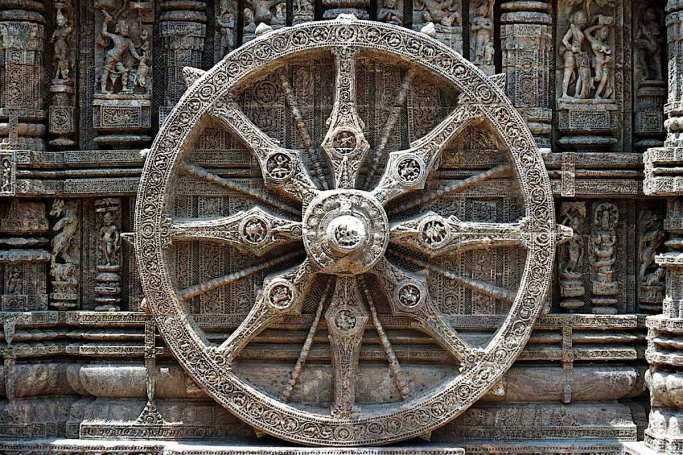Today I would like to introduce you similarities between modern business philosophy and ancient wisdom which means many of really good proved tools of Buddhism could be applied into business and modern life to gain more effective and efficient life in short and long run. I am very pleased to witness is how the business philosophy becomes wise.

On the picture you can see the classical image of the Weel of Karma - the curcle of reasons and consequencies, the base concept of Hinduism and Buddhism. From our own experience we know, the more developed and wise a person is, the more he or she know how reasons create results and make decisions to avoid bad results and produce good. This is also a common sense which links seeds with fruits.
Just one glance: the statement is our previous experience which comes with passion could produce the same results in future.
Let`s see how it is described in today article by Dr.Ichak Adizes: "Two guys visit Paris. One says: "Paris is a terrible place. Prostitutes everywhere. Cheap bars. Dirty streets."
The other guy says: "Strange. I was in Paris too. I saw no prostitutes and no cheap bars. Only museums and incredible architecture."...
You hear, see, notice, and experience what you are looking for. If you do not look or expect, it will not be there. The reasons behind our (compulsive) search are multiple. ..."
Now have a glance to the quote from 7th sentury BC:
Now as a man is like this or like that,
according as he acts and according as he behaves, so will he be;
a man of good acts will become good, a man of bad acts, bad;
he becomes pure by pure deeds, bad by bad deeds;
And here they say that a person consists of desires,
and as is his desire, so is his will;
and as is his will, so is his deed;
and whatever deed he does, that he will reap.
—Brihadaranyaka Upanishad, 7th Century BC
quote from 7th sentury BC:
Now as a man is like this or like that,
according as he acts and according as he behaves, so will he be;
a man of good acts will become good, a man of bad acts, bad;
he becomes pure by pure deeds, bad by bad deeds;
And here they say that a person consists of desires,
and as is his desire, so is his will;
and as is his will, so is his deed;
and whatever deed he does, that he will reap.
—Brihadaranyaka Upanishad, 7th Century BC
So, as we see so many common points and recognize it is not by a chance, but because it describes the same thing, we can use the huge experience and approachs existing in Buddhism (not in religious institute but in the pure essence) to correct it.
- See more at: http://www.ichakadizes.com/you-see-what-you-look-for/#comment-8441
quote from 7th sentury BC:
Now as a man is like this or like that,
according as he acts and according as he behaves, so will he be;
a man of good acts will become good, a man of bad acts, bad;
he becomes pure by pure deeds, bad by bad deeds;
And here they say that a person consists of desires,
and as is his desire, so is his will;
and as is his will, so is his deed;
and whatever deed he does, that he will reap.
—Brihadaranyaka Upanishad, 7th Century BC
So, as we see so many common points and recognize it is not by a chance, but because it describes the same thing, we can use the huge experience and approachs existing in Buddhism (not in religious institute but in the pure essence) to correct it.
- See more at: http://www.ichakadizes.com/you-see-what-you-look-for/#comment-8441
So, just in a couple of quotes, we can see similarities. It is like in the wise story about elephant and three blind men who was trying to learn who an elephant is by touching… at the present moment of business philosophy it seems like such blind men eventually discover the whole elephant and so they have the same description about their experience in their heads,,, it needs just to compare it to realize they all are right so let`s collect different
When we divide the core philosophy and practice of Buddhism from the common religious institutes (which is not the same) we can found:
a lot of tools, proved experience, solutions, structures, descriptions and recommendations are already exists. As Buddhism from the core calls for development, it is the subject of modern Sustainable Development call.
What we need to gain our future while even our planet is changing as the result of our activities? How can mankind survive without understanding the links of reasons and consequencies which produce our today and tomorrow?
As true religion, true science, true philosophy and true practice are the same being just a different angles of view and apply, it should works together for the best short and long run result. All together should use experiencies of each others to create new solutions.
This is the reason I am working in the inter disciplinary field of business, philosophy, Sustainable Development being a Buddhist-in-practice. That way I am trying to use all proved experience and put it into modern practice for the best short and long run results because this is nesessity calls by our modern trends.
Let`s put into our practice ideas we already have proved and developed. Let`s touch the core through different words.
Read the full article by Dr.Ichak Adizes here www.ichakadizes.com/you-see-what-you-look-for/